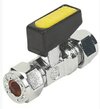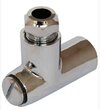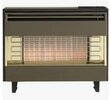We have a gas fire that was fitted a number of years ago by a gas safe engineer, never had an issue when serviced in the past.
Today we had it serviced (different engineer) and was informed that a gas restrictor valve should have been fitted instead of a gas isolation valve!?
Is there a fundamental difference between the two and should a gas restrictor be fitted instead?
Pics attached
Today we had it serviced (different engineer) and was informed that a gas restrictor valve should have been fitted instead of a gas isolation valve!?
Is there a fundamental difference between the two and should a gas restrictor be fitted instead?
Pics attached





